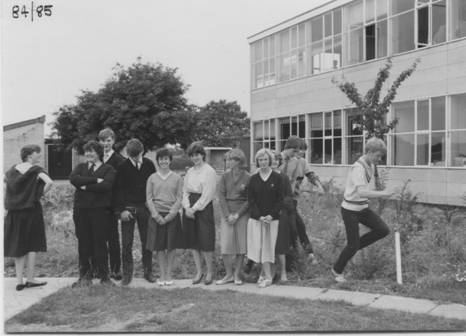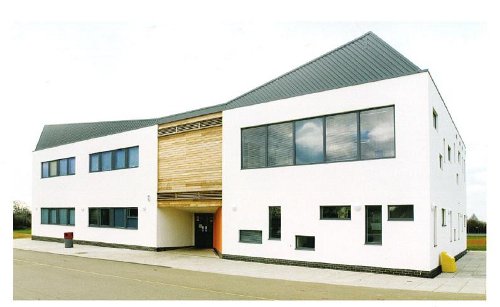A Brief History of Roundwood Park School
The school was opened in September 1956 as a two-form entry non-selective secondary school.
 With Grammar schools in nearby St Albans, that meant that it was in reality a secondary modern school although as its pupils reached school leaving age (15 in those days) it soon became apparent that many wanted to stay on into the fifth year and take ‘O’ levels so that facility was provided.
With Grammar schools in nearby St Albans, that meant that it was in reality a secondary modern school although as its pupils reached school leaving age (15 in those days) it soon became apparent that many wanted to stay on into the fifth year and take ‘O’ levels so that facility was provided.
The school opened with three teaching blocks – still recognizable as ‘B’ block, ‘C’ block and the hall, gym etc. where the staff room and offices were. There were three forms, one in each of the second, third and fourth years and three first year forms, making a total of 179 pupils. There were ten teachers including the first head teacher – Mr Arthur Foxwell. The school was organised into four houses – Braille, Campbell, Grenfell and Nightingale – thus providing a competitive element for the popular Sports Day and, from 1961 when the town’s pool was opened, the Swimming Gala.
After three years, the school had reached its planned maximum size but often exceeded that over subsequent years due to its increasing popularity with local residents as well as those in Wheathampstead and Redbourn. Now we receive many pupils from the other villages – Markyate, Flamstead and Kimpton. This is partly due to the closure of smaller secondary schools in Redbourn and Wheathampstead so that the ‘economies of scale’ can be taken advantage of, full comprehensive provision within Hertfordshire and also due to parental preference.
 In 1961 the first fifth years sat ‘O’ levels and gained a total of 51 passes. During the early years, those who were successful at ‘O’ levels transferred to nearby Grammar schools in St Albans and Hatfield, often going on to Universities. During the late 1960s and early 1970s, selection was being dropped and in 1970 there were extended buildings and the school became a five-form entry comprehensive fitting the accepted Hertfordshire pattern at the time. By the early 1970s Roundwood had a growing sixth form and many students were going to Universities and Polytechnics. This has continued and we all recognise that Roundwood has become one of the highest achieving comprehensive schools in Hertfordshire reflecting the socio-economic make up of its intake area.
In 1961 the first fifth years sat ‘O’ levels and gained a total of 51 passes. During the early years, those who were successful at ‘O’ levels transferred to nearby Grammar schools in St Albans and Hatfield, often going on to Universities. During the late 1960s and early 1970s, selection was being dropped and in 1970 there were extended buildings and the school became a five-form entry comprehensive fitting the accepted Hertfordshire pattern at the time. By the early 1970s Roundwood had a growing sixth form and many students were going to Universities and Polytechnics. This has continued and we all recognise that Roundwood has become one of the highest achieving comprehensive schools in Hertfordshire reflecting the socio-economic make up of its intake area.
Mr Foxwell retired in 1976 after 20 years as Headteacher and Mr Turnbull took over for 2 years, being followed by Mr Haydon Luke who stayed for 17 years. Andy Cunningham stayed for 6 years and was replaced by Mr Nick Daymond who also stayed for 6 years until he was succeeded by the current Headteacher, Mr Alan Henshall. At various times in between, the Deputy Heads have held the fort – Mr Lucas, Mr Surtees and Ms Linda Graham – all contributing to the continuity and stability that have been part of the Roundwood ethos.
 There have been many changes over the past 60 years resulting in upheaval and disruption – increasingly frequent times when the site appeared more like a building site as a new Sixth Form/Modern Foreign Languages block was constructed, soon to be followed by a new Maths/Music building and a Sports Centre. The school is also now an Academy. The changes have not affected the ethos of the school and Roundwood Park remains the same, continuing to educate local children in a caring and supportive way that encourages them to develop their best talents through a broad and balanced curriculum.
There have been many changes over the past 60 years resulting in upheaval and disruption – increasingly frequent times when the site appeared more like a building site as a new Sixth Form/Modern Foreign Languages block was constructed, soon to be followed by a new Maths/Music building and a Sports Centre. The school is also now an Academy. The changes have not affected the ethos of the school and Roundwood Park remains the same, continuing to educate local children in a caring and supportive way that encourages them to develop their best talents through a broad and balanced curriculum.
This article is adapted from the original produced for the 50th celebrations by Ruth Martin & Christine Hood.
UPDATE
On 13 September 2018 Roundwood Park was proud to officially open a state of the art 3G artificial pitch on the school site. A joint venture with Harpenden Colts FC, and with a £500,000 grant from the Premier League and the FA Facilities Fund, it allowed us to replace the existing grass pitch, which was unsuitable for football during the winter months.
The new pitch is used by all students and players from the school as well as Harpenden Colts FC, who operate around 60 teams across eight different training venues. Watford FC Community Sports and Education Trust also use the pitch to deliver sessions for female and disabled football, as well as its use for regular summer holiday camps and coach education workshops.



